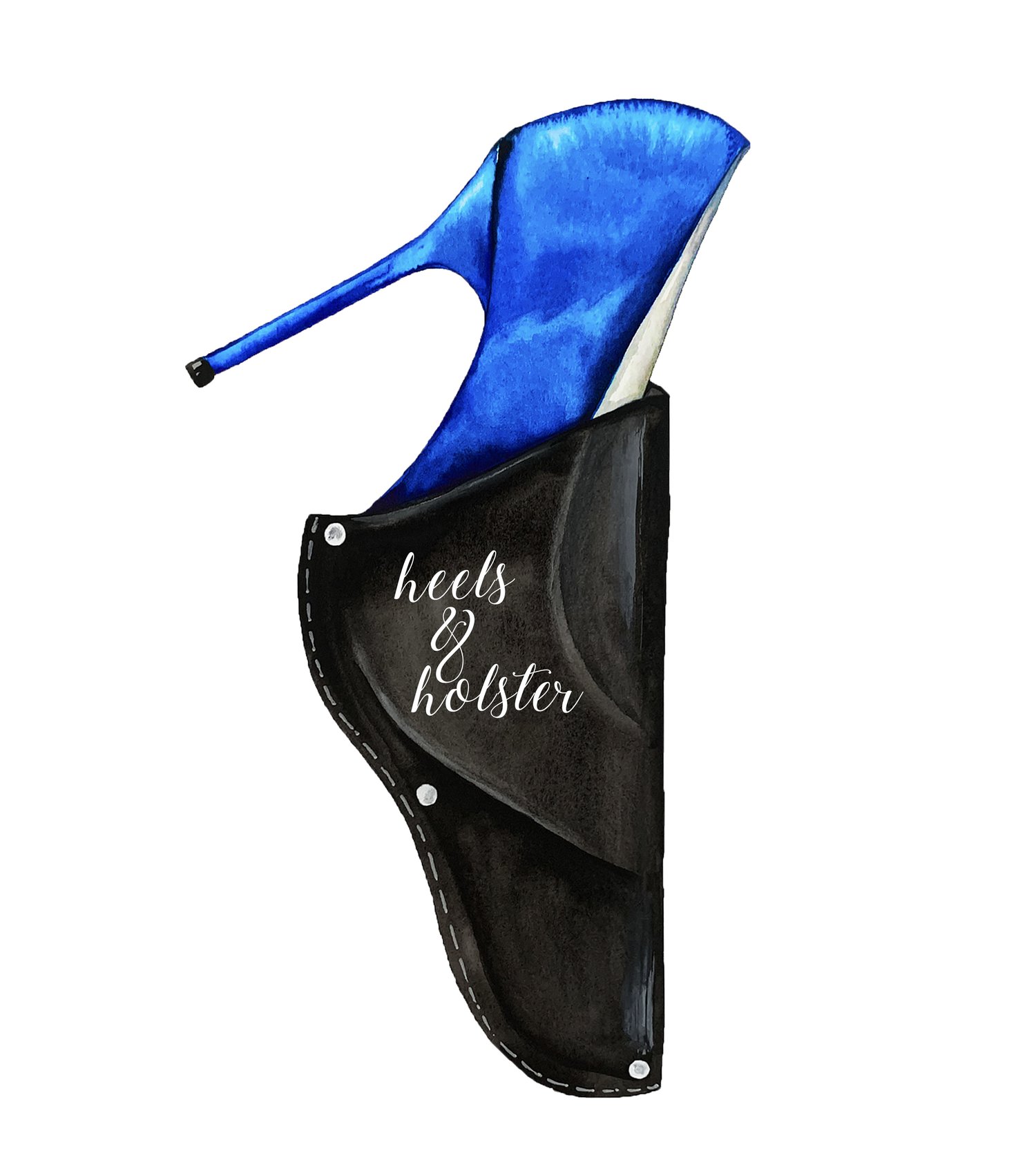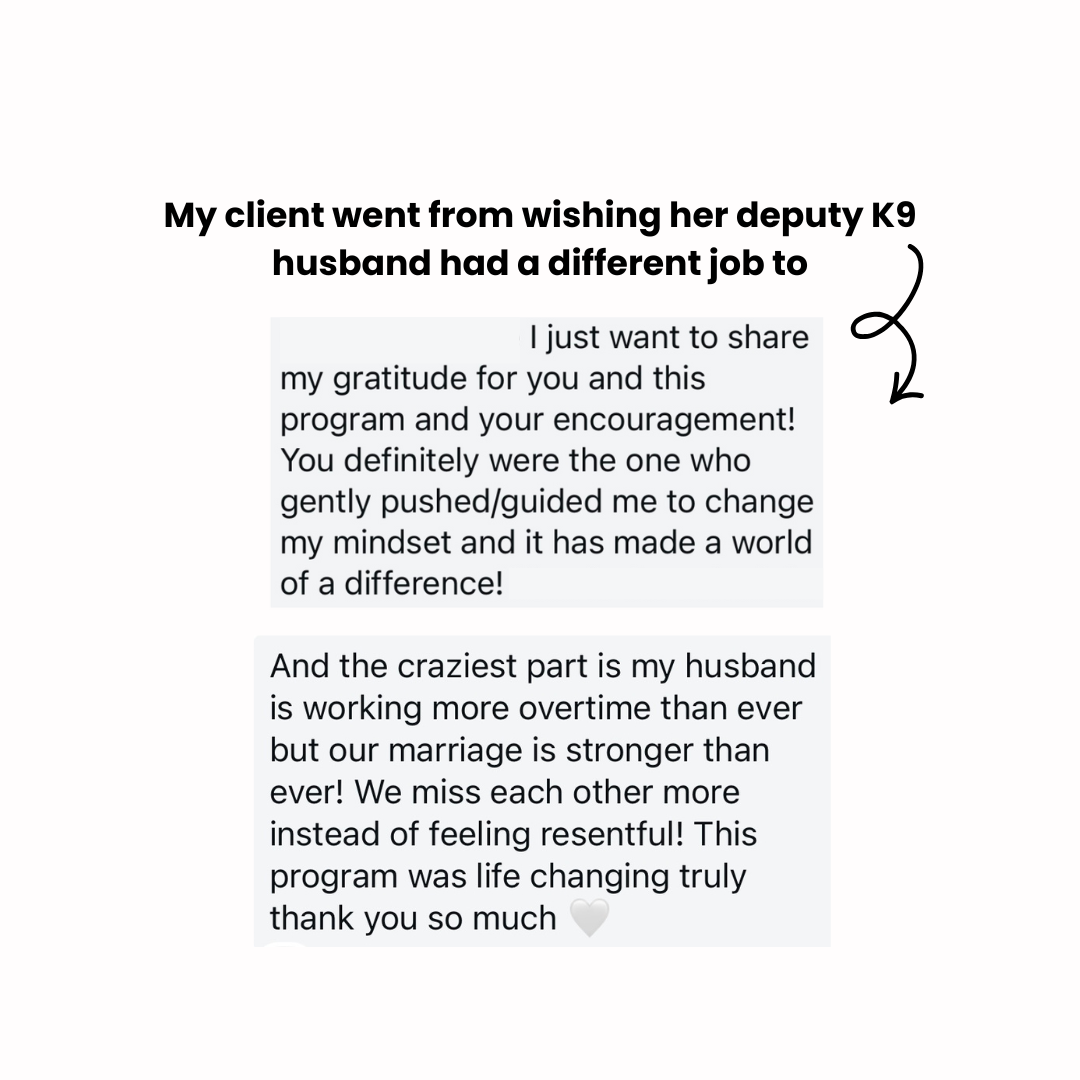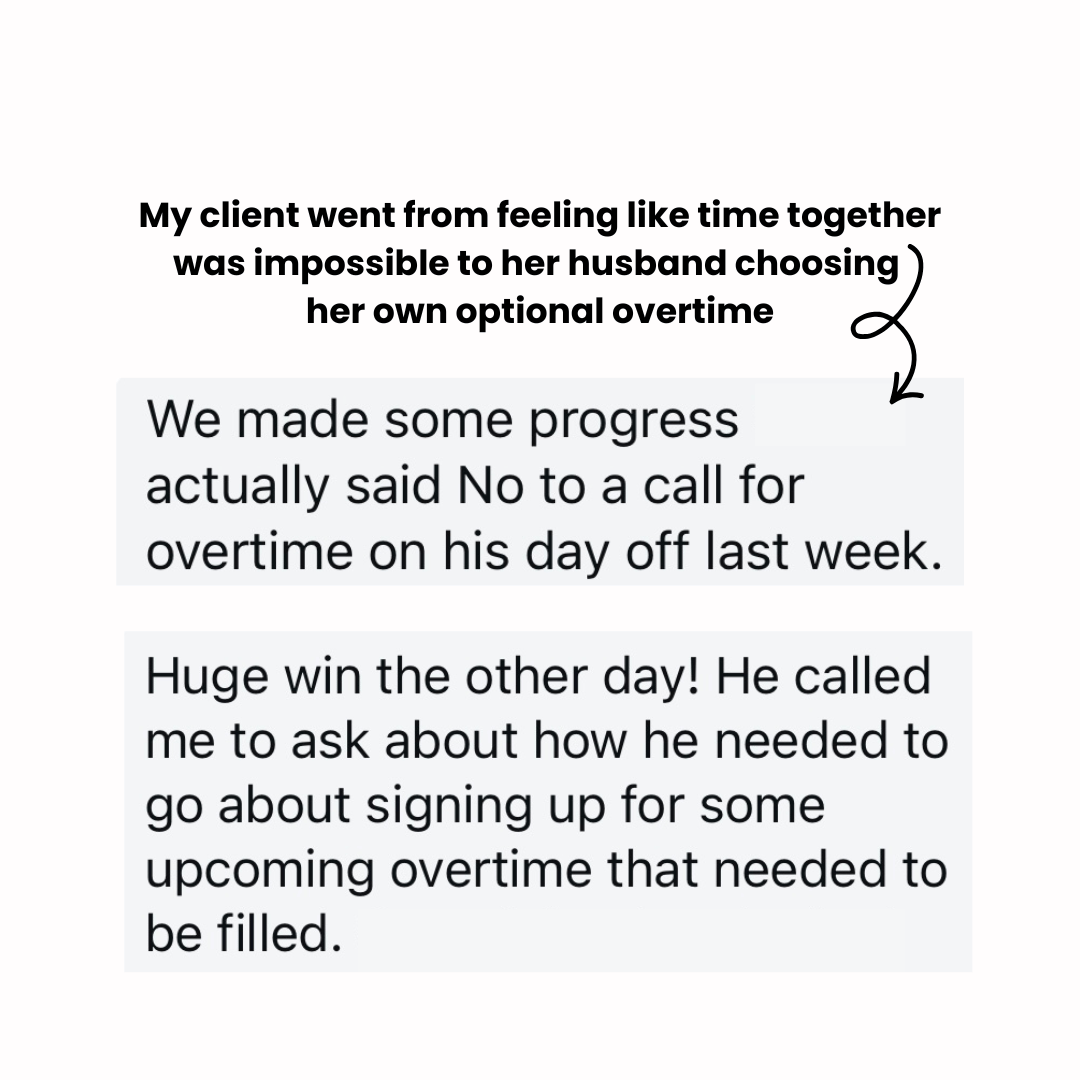
Resilient Ride Along
I know what you’ve been living with up until now…
You rarely get uninterrupted time together leaving you feeling distant from your partner. You’re passing by your partner when he gets home and you’re heading to work leaving you feeling like you can’t connect.
You feel like you’re walking on eggshells when he’s home. He rarely shares his feelings with you leaving you feeling disconnected.
Your partner is bad at communicating with you. This looks like you two having miscommunications, constant tension, and the same argument over and over.
You no longer want to be a first responder or military partner or family. You talk about your anxiety about his job so much that everyone knows you’re not happy. You would love to support your partner, but you don’t think first responders or people in the military should be in serious relationships or married.
And I want you to know… it doesn’t have to stay this way.
Resilient Ride Along is a six-month group coaching program (3 month mini-version available) to master the mindset, daily routines, and communication skills that make a life-long first responder or military relationship feel strong, supported, and deeply connected.
This is where you go from:
🚫 Rarely having uninterrupted time together without the kids or without him getting called into work
🚫 Feeling disconnected and resentful when he’s gone
🚫 Having tension every time you talk about his job - When you say ‘You have to work again this weekend?!” He responds with “Yep.” and that’s all you get.
🚫 Wondering if this lifestyle is even sustainable - it feels like he’s more committed to his job than you at this point.
To:
More time off than ever before together. He’s voluntarily turning down optional overtime to be with you and your family. You have regular dates together— some are simple like him initiating strolls over coffee around the neighborhood— other dates are spicy with yoga butt slaps leading into spicy dessert in the bedroom. You’re recharging together. He’s sharing his feelings, and you feel deeply connected to him on his days off.
You’re having deep conversations together where your partner is sharing his feelings, because you know exactly what to say to have him opening up to you. You feel as connected as you did when you were young and kid free.
Your partner’s reaching out more to you when he’s at work. You feel closer than ever to him even when he’s away.
You look forward to your own routine when he’s away. You’re loving brunch and park play dates with friends and volunteering at church. When friends who don’t have strong, first responder/military relationships say, “you should see your partner more,” you brush it off confidently. Even when unexpected overtime comes up, you tell your partner, “Have a good day at work. Stay safe. I’ve got this,” because your routine runs smoothly no matter what shift he works.
You know deep down that you hold a special role in society and you’ve built the mindset, routines, and communication to have a deep connection with your partner and truly enjoy each day. You have a fierce, bulletproof confidence in your relationship.
This is the reality I’ve created in my marriage.
This is the home I help my clients create every single day.
The absolute best place for you to create this and quickly is inside my Group Coaching program, RRA.
Inside Resilient Ride Along, we refine:
Your gratitude mindset so he’s telling you, “I didn’t realize how much you loved me,” and making you his first priority.
Your daily routines so you never say, “I’m doing it all alone” again—your home runs smoothly no matter his shift or deployment.
Your consistent quality time together so you recharge as a couple with deep talks, shared emotions, and intimate connection.
Your communication skills so you know exactly what to say when a traumatic incident happens at work and he actually opens up to you.
Your confidence so you brush off family or friends’ comments like, “Shouldn’t you see each other more?” knowing your bond is bulletproof.
Allow me to explain a quote that inspired the name of this program, “You were made for this. Ride it like a wave.” This is a mantra I used when I was in labor with our second son, who was facing the wrong way and came out sunny side up. As you think about your unique role as a first responder/military partner, you were made for this. You may need to realign your mindset, daily routine, and communication to accommodate your unique lifestyle, but by the time you’re don’t with their program, you will have an unshakeable confidence and pride in your unique role in society.
Here’s what you get inside:
✔️ Two live group coaching calls a month (recorded; access to all recordings)
✔️ Private Q+A support between calls via Telegram group chat
✔️ Access to all my micro-offers (Shift Happens, Empowered Partner courses and more) during the program
Don’t miss my client transformations below.
You won’t believe my client marriage transformations.
Client A. My client’s police marriage is “stronger than ever”—she feels supported and like they face challenges together even though her husband is working more overtime than ever
When she first came to me, she said her husband felt like she didn’t support his career. In fact, she secretly did wish that he had a different job. She had been a teacher prior to becoming a SAHM and always envisioned sharing weekends and holidays together as a family. He husband moved into a specialized K9 unit quickly in his career; he was passionate about it and not going anywhere.
My client was feeling resentful and alone. She was upset over her husband not being able to pick her up at the airport due to being called into mandatory overtime even though he called a friend and coordinated a ride for her all while she was in the air.
They had already tried couples therapy, but it wasn’t helping.
In her first coaching session with me, she said she had heard me say, “you have the power to change the dynamic in your relationship”. She said, “you must know something I don’t.” As a police wife myself and the default parent of our two children, I did know something and saw so much hope for her marriage. I had been in her shoes and had gotten out of the resentful funk myself.
I started by challenging her to begin my 30 Day Gratitude Challenge, which helped her to begin shifting her negative thoughts to positive- and it did more than just that. You see, the 30 Day Gratitude Challenge isn’t just for you.
Her husband said, “I never knew just how much you loved me.”
Rather than meeting him with tension so thick he could feel it when he got home from work, she met him with gratitude. He met her energy by doing the 30 Day Gratitude Challenge voluntarily and even interrupted one of our Resilient Ride Along group coaching calls to surprise her with flowers and chocolate for Valentine’s Day. You see, you do have the power to shift your relationship from tense to loving.
Mindset shifts and changes to how they spent time together and communicated resulted in resiliency. Against the odds of her husband having to work more overtime than ever, she described her marriage as “strong” and they face challenged “together.”
You have the power to create this change too.
Client B. My deputy K9 client went from questioning whether or not her husband really loved her to feeling so proud and confident in her marriage.
When my deputy K9 wife and biomedical researcher client first joined Resilient Ride Along, she felt like time together with her husband was impossible.
On our very first call, she pulled out her calendar and sighed:
“Our schedules conflict. He works nights and most weekends. I work weekdays, daytime in an intense biomedical job. Even when he has weekends off, he often gets called into overtime.”
But, as we worked together, coaching revealed that the truth went deeper than just their conflicting schedules.
Her husband was saying yes to optional overtime without talking to her. That left her lonely, disconnected, and wondering: “Does he love the job more than me? Would he rather go to work than spend time with me? How will we ever start a family like this?”
On top of that, the weight of her husband’s work was showing up at home. After years of traumatic calls—searching for missing people, often finding them deceased—with very little time off to decompress, he was constantly on edge. At home, it looked like snapping at her and the dogs to get out of his way. He would be cooking dinner for them, which seemed like a nice gesture, but then yelling at them to get out of his way. The smallest things set him off. She said it felt like a bomb waiting to go off. She knew every extra shift he picked up wasn’t just stealing time with her, it was also stealing the time he needed to decompress.
If you’ve ever felt like you’re walking on eggshells when your partner’s home, or like the tension of his job follows him into your living room, you know how heavy that can feel.
She didn’t know how to bring it up without it turning into another argument.
Inside Resilient Ride Along, she learned two trauma-informed communication tools: Gentle Observation and Assertive Trauma-Informed Communication. With these, she approached him with compassion and clarity at a time he was biologically available to actively listen. For the first time, they talked about overtime without fighting. And the shift was real. He started talking to her when he was offered optional overtime and saying no to optional overtime. One one Resilient Ride Along group coaching call, my client shared that they had back-to-back breakfast and dinner dates this past week. She told me:
“Huge win! He actually called me before signing up for overtime. And he even said no to a call for overtime on his day off last week.”
I supported my client to establish non-negotiable, consistent quality time together. As she thought about this more, she decided that she would like to take weekend getaway trips outside of their County so her husband could truly relax and not be called into optional overtime. She planned these getaways quarterly. She grew in her confidence that she and her husband’s life looked different than others and that was okay. She shared that her mother commented, “You take a lot of vacations.” She said and her husband responded, “That’s just what we need to do.” My client stopped allowing other people’s opinions to influence her. She supported her husband’s career and still got consistent time with him to decompress.
While I taught my client about the physical effects of trauma and the benefit of regular exercise on alleviating trauma symptoms, my client shared that she and her husband weren’t very active. They both didn’t work out, but my client shared that her husband used to play football in high school and still played for fun after graduation. She remembered just how much happier he seemed when he did that. I asked her if she had shared that with him. She had not. Using a technique she learned in coaching, Gentle Observation, my client shared with her husband what she shared with me.
You’re not going to believe this. My client’s husband began jogging with his coworkers at work within a week of my client gently sharing with him how happy he used to be when he played football. My client saw a peaceful version of her husband. No more yelling. Hugs and kisses for her as he barbequed and pats for the dog.
This is the kind of transformation that happens inside Resilient Ride Along.
Where the miscommunication, distance, and tension get replaced with more quality time, deep conversations, and a stronger bond than you’ve ever felt before.
Because it doesn’t have to stay the way it is now.
You can have a marriage that feels connected, supported, and resilient—even in the face of the hardest job stress.
That’s exactly what we do inside Resilient Ride Along—a six-month group coaching program (with a 3-month mini version available) designed to help first responder and military wives master the mindset, daily rhythms, and communication skills that make their relationships not just survive this lifestyle—but thrive in it.



